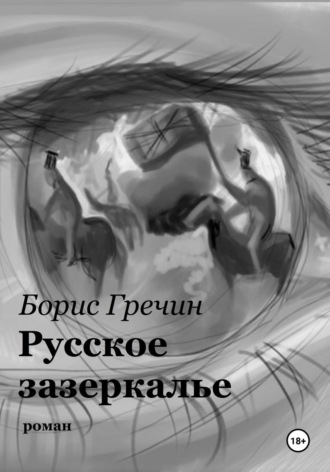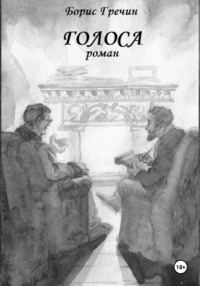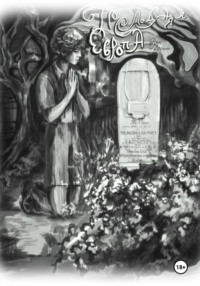
Полная версия
Русское зазеркалье
[y]ou're tied to a pump and a breathing machine,
With their X-rays and probes and their monitor screens,
And they'll wake ye up hungry, saying ‘How do ye feel?’
And then you're stuffed full of pills and a barium meal—
and when
…you’re laid like a piece of old meat on the slab,
And they’ll cut and they’ll slice, and they’ll poke and they’ll jab,
And they'll grill ye and burn ye, and they'll wish ye good health,
—whereas our death in a war would be instantaneous and almost painless.
The fact that everyone most certainly dies was an absolute revelation for Leo Tolstoy during his stay in Arzamas, a city in Nizhniy Novgorod province. This coincidence is widely known in the history of Russian literature as the so-called ‘Arzamas horror.’ I know that what I am saying has an element of ridicule in it, because it sounds as if the celebrated world famous author had suddenly discovered that two plus two equals four—‘and for him, it was an absolute revelation.’ Please don’t be in a hurry to ridicule Leo Tolstoy, though: only a limited number of people actually can go through the emotional acceptance of their own death when they are still very much alive and not quite old. I am not certain that I am among those people; as for you, I am not even certain that you have ever tried to imagine your own death. My recommendation for your further reading on the Arzamas horror is ‘The Arzamas Horror: a Sample of Tolstoy’s Psychopathology,’ an article by Daniel Rancour-Laferriere, published in Tolstoy on the Couch in 1998 (the publisher is Palgrave Macmillan). Please do not forget to answer the question: Do you agree with what Daniel Rancour-Laferriere says about Leo Tolstoy’s psychopathology? Why do you, or why don’t you?
When seen from a broader perspective, a planetary disaster is still much worse than our own death. Why? Simple as this question may be, you are completely incapable of answering it as long as you fail to find this perspective. For a religious person, the answer is easy: our death, no matter from what reason, is nothing very special in itself, as our mind doesn’t cease to be after the death of our body. But then, no-one can guarantee that the realm in which you suddenly find yourself after your death will be a very nice place, not even if you are a believer—especially not if you are a believer who believes in hell and demons inhabiting it. Nowadays, many people think that what is needed is sort of a lite version of traditional religions that would contain nothing ‘medieval, ugly, or unpleasant,’ and this is how Christianity Lite, Buddhism Lite, and other such bizarre phenomena emerge. I do not think that all these versions work, as they obviously do not ‘do the job,’ do not perform the task that religious knowledge shall perform. They do not move us to be better human beings than we are—they also fail to give us reliable knowledge about spiritual reality as it exists. Imagine that there is a certain social media application through which you can socialise with your friends and with anyone you like. This application is for free—but then, it has an important disadvantage: each of your posts can be disliked by others, and there is a special thumb down button in there. You do not approve of the very idea of someone disliking you, you do not want to bear that much, so you simply refuse to install its full version—instead, you go on with its lite version, manufactured by some guys from Eastern Europe, that you have found somewhere on the Pirate Bay. This lite version doesn’t allow anyone to give you thumb down, in fact, it has no thumb down button at all, and you think yourself very clever man (or woman, or whoever you are). But no, the guys from Eastern Europe have cheated you. This lite version only gets you in touch with Internet bots and other such algorithms, so it practically is of no use. You cannot socialise with real human beings via this fake application, you cannot buy or sell anything via it, you cannot ask a nice girl for a real date, because this nice girl is just an algorithm or a product of artificial intelligence in the very best case. This girl doesn’t exist in flesh, and never will be. This is what I think of Christianity Lite and other such spiritual surrogates that pretend to completely eliminate suffering from our life and from our afterlife without any special efforts of ours.
You may reject the religious perspective altogether, but the question of how to peacefully accept your own death is still there. For a believer, death may be horrible because he or she doesn’t know whether he or she ‘qualifies for Heaven,’ so to speak. For an atheist, death is horrible because life is generally pleasant, and then this pleasant continuation suddenly comes to its end, and there is nothing there ever more. In the event live is not pleasant—suicide logically is the best possible option: that is, if you stick to your atheistic views as firmly as a believer sticks to Christ, or Allah, or the Buddha. But you probably don’t.
…To die, to sleep;
To sleep, perchance to dream—ay, there's the rub:
For in that sleep of death what dreams may come,
When we have shuffled off this mortal coil,
Must give us pause—there’s the respect
That makes calamity of so long life.
As it seems, Hamlet’s famous monologue doesn’t deal with either firm believers or firm atheists. It is spoken by someone who doubts, by someone whom you perhaps would eagerly identify yourself with. Dubitare humanum est, to doubt is human, isn’t it? I would go even further and say that Alexander Rosenbaum, too, has taken no side between firm believers and firm atheists—he, like Hamlet, does not initially recognise his, or maybe his father’s, own ghost. (Is the person that his protagonist sees actually a ghost? Another question to explore.) Some of you regard the very possibility to doubt in anything as your safe harbour. At the end of their lives, those persons may be unpleasantly surprised by the fact that doubt, while having made them more intelligent (arguably so), has failed to remove their anxiety and fear.
I hope you will now agree with me when I say that this song doesn’t score so very low even on the vertical. But there is still more in it. How much we can get from any work of art depends on how attentive we are to its details. Of course, there always remains the possibility of our misinterpreting those details or of our squeezing them so hard, figuratively speaking, that they give away more than the author actually put into them. And yet, I am not afraid to squeeze them hard, because I firmly believe that getting more from an artwork than its author wanted us to give is definitely better than getting less than that from it. So will you please follow me in my exploration of allegedly minor details of this story?
Here they are. Firstly, pay attention to the snowflakes that do not melt when landing on the old man’s body as well as to the fact that he is walking on water as if it were solid ground. Is he a living human being, or a ghost, or perhaps a zombie? An average body temperature of a living man would probably melt the snowflakes, so the alter ego of the author is probably not alive. On the other hand, the same snowflakes would not stick to a ghost, so he cannot be a ghost. A walking dead body? No, because he guffaws at the author and then instantly disappears, thus excluding all three possibilities. What makes us believe that this meaningful encounter has really happened? I guess it is the fact that the author recognises himself in a mirror as the old man he once saw, thereby confirming that this encounter was not just a product of his own imagination. But then, where could it possibly happen? Was it a real location, say, somewhere in the Leningrad region? But how could it be real, considering white fog and snowflakes, the two factors that cannot easily coexist? I believe the question makes no sense at all. Here comes another lengthy quotation.
Midway upon the journey of our life
I found myself within a forest dark,
For the straightforward pathway had been lost.
Ah me! how hard a thing it is to say
What was this forest savage, rough, and stern,
Which in the very thought renews the fear.
So bitter is it, death is little more
—which seven lines, translated from Italian by Henry Wadsworth Longfellow, open the ‘Inferno,’ the first book of the Divine Comedy by Dante Alighieri. Do we really want to interrogate Dante Alighieri about the exact location of his dark forest? Do we really pretend to believe that that forest physically exists, or had ever existed, somewhere in Italy? I think it is safe to say that this forest exists in poet’s imagination only. But wait: haven’t we agreed before that anybody’s imagination has no value at all as it only produces pure phantasms?
Herein is the source of our mistake: we, meaning you and me, have never actually agreed to regard the nocturnal part of human consciousness, being our fantasies, dreams, and premonitions, as something that has no meaning at all. The idea was simply superimposed onto us by the logic-centered rational education we have received at school, so we gradually grew into belief that this idea is true under any conditions. It is not. Were it true, such works as the Divine Comedy or Richard Wagner’s Tristan und Isolde would never be written.
How valid can be the information that we receive by mediation of the nocturnal part of our mind? To what extent does contemporary art still require this part? How is it possible to talk about artistic education when considering that education basically relies on the diurnal activity of our mind? Do art and education mutually exclude each other, and if they don’t, how can they possibly come together? I will be happy to receive some answers to these questions from you during the second part of our lesson.
Let us, secondly, give a thought to the guffaw the old man utters when he sees his younger self. What is he laughing at? Is it the futility of all human endeavors?
What youthful mother, a shape upon her lap
Honey of generation had betrayed,
And that must sleep, shriek, struggle to escape
As recollection or the drug decide,
Would think her Son, did she but see that shape
With sixty or more winters on its head,
A compensation for the pang of his birth,
Or the uncertainty of his setting forth?
—to quote from William Butler Yeats’s Among School Children: a poetically shaped question to which I have no answer to provide. You have probably noticed that the song I have been talking about for already half an hour poses more questions than it gives us answers. Good questions are not less valuable than good answers. I will admire those of you who will attempt to provide a meaningful answer to this poetically shaped question.
Why is author’s alter ego in dirty rags, thirdly? Doesn’t it actually mean that he dreads himself? Do not we, too, dread ourselves when seen from aside? Have you ever tried to record your own voice and to replay it to yourselves? Don’t you hate listening to your own voice? I am very close to say that I do. Imagine that we could invent a machine recording our own thoughts and emotions and that we would be able to replay them to ourselves. Would we bear it? Would we be able to simply recognise ourselves in this emotional mirror?
We most likely wouldn’t. The author does not recognise his other self who is only some years or maybe some two decades older than he is. I do not want to interpret it in Freudian terms, and I do not see it as a sign of psychopathology. For me, it simply means that we are afraid of our own selves, because we do not really dare to look at what we truly are. According to Jean-Paul Sartre, ‘Hell is other people.’ True, but not quite, because before it ever comes to others, Hell is us. We do not accept what we are. (Can you explain why?) How can we ever hope to coexist with others? We fail to learn ourselves. How can we ever hope to learn others? ‘Each of us bears his own Hell’—I guess it was Virgil who said that.
This was my exploration of ‘Foretelling My Destiny’ by Alexander Rosenbaum. I hope you have enjoyed it.29
~ ~
Наши занятия проходили в не очень большой аудитории, широкой и короткой, имея в виду, что маркерная белая доска за моей спиной была на длинной стене. По обе стороны от прохода стояло три ряда столов, за каждым из которых теоретически помещалось четыре студента, итого аудитория могла вместить двадцать четыре слушателя – «избыточная мощность» для группки, записавшейся на мой спецкурс. Патрик в этот раз никуда не выбежал, сидел и слушал с нервным вниманием, порой приоткрывая рот, так что я всё время собиралась предложить ему спросить, что он хочет, и один раз почти это сделала, – но нет, поймав мой взгляд, он отводил глаза, а ради человека, который на тебя не смотрит, прерывать лекцию вроде и совсем неуместно. Итак, Патрик никуда не убежал, но некоторая ротация всё же произошла.
Во-первых, примерно на половине моего монолога дверь открылась, и в класс бесшумно вошёл сэр Гилберт. Я так по-ребячески обрадовалась ему, что вся разулыбалась и уже хотела помахать ему рукой – он, тоже улыбнувшись, приложил палец к губам, на цыпочках подошёл к месту на третьем ряду, беззвучно отодвинул стул, сел. Кажется, его появления никто и не заметил – только Патриша бросила быстрый взгляд через плечо.
И вот Патриша как раз учудила. В моей группе было девять студентов, из них шесть британцев (Сирша, Кэри, Кэролайн, Люк, Патрик и Адам), один француз, полностью, впрочем, натурализованный, с отличным английским (Конрад), одна португалка (Бригида) и одна американка (Патриша): девушка среднего роста, худая как жердь («плоская как доска», сказал бы мужчина, но ладно уж, что там – не будем словесно харассить бедняжку), с хорошими густыми волосами, но отнюдь не красавица, увы, даже не миленькая. Британцы и Конрад садились обычно на первый ряд, Бригида – на второй ряд слева от прохода, ближе к учительскому месту, Патриша – на второй ряд справа от прохода. Получалось, что она сидит на своей половине ряда в гордом одиночестве. Как и Бригида, впрочем, но если Бригида, не очень хорошо говорившая по-английски, этим не тяготилась, то американочка, похоже, страдала своей отвергнутостью. Даром что прямо передо мной на первом ряду оставалось одно свободное место – нет, так близко ко мне она сидеть тоже не хотела, видимо, считала это некомфортным… Во время первой лекции она и рта не раскрыла, просто сидела, хлопая глазками, с прямой спинкой, так что у меня не было возможности понять, умненькая она девочка или не очень. Оказалось – не очень…
Но обо всём по порядку. Ближе к концу лекционной части Патриша встала и вышла, как за два дня до неё Патрик, но если в уходе Патрика просто чувствовалась некая брезгливая усталость, отказ от желания быть свидетелем странного перформанса, смысла в котором он не видел, то Патриша будто несла на плечах весь груз оскорблённой в её лице американской нации. Сэр Гилберт приоткрыл рот: для него этот демарш, как и для меня, был, видимо, неожиданностью. Несколько голов повернулись вслед американке – покровитель колледжа был при этом наконец замечен, и три-четыре студента его поспешно поприветствовали. (Остальные – нет: похоже, покровитель был не очень частым гостем, появлялся раз в году на торжественном мероприятии, а кто на таких мероприятиях не бывал, и не знал, как он выглядит.) Сэр Гилберт, ответив на приветствия, дал жестом понять, что не хочет мешать занятию, и вышел из класса так же бесшумно, как вошёл. Аккуратно прикрыл за собой дверь. Как жаль! Я бы и его не постеснялась вовлечь в обсуждение, а он, вероятно, охотно бы поучаствовал.
Ближе к концу всего занятия в дверь просунулась головка Ани:
– Miss Florensky, the principal would like to see you. Morning!30
Между прочим, как я узнала, официальным названием должности руководителя было здесь vice-chancellor31, но Аня зачем-то упорно называла свою начальницу the principal32: может быть, ей само слово нравилось. Отпустив группу, я поспешила за ней; Аня, идя впереди, изредка оборачивалась, будто проверяла, не убежала ли я. (Что хоть там такое стряслось?) Довела меня до самой двери кабинета директора, с улыбкой её открыла, вошла вслед за мной, закрыла дверь и встала у неё будто вежливый улыбающийся часовой.
В кабинете, кроме самой миссис Уолкинг, уже был сэр Гилберт, благодушно развалившийся сбоку на маленьком кожаном диване. Я поздоровалась с руководством, присела на стул для посетителей.
Миссис Уолкинг, не глядя на меня, вертела в руках какую-то безделушку. Поймала мой взгляд, вымученно улыбнулась
[сноска через несколько страниц]:
– Morning! The thing is, Alice… Patricia has complained about you.
– What about? – выдавила я. Приехали! Сейчас уволят меня с волчьим билетом, и визу не продлят, и «водочки нам принеси, мальчик! Мы на родину летим». Только мне, в отличие от героев «Брата-2», никто не поднесёт водочки.
– I didn’t get it right, something about intimidating her—she was furious, actually, simply boiling with rage. Miss Welsh, could you please find Patricia and bring her here?
– Yes, madam! – мелодично отозвалась Аня и ушла за жалобщицей.
– I say again, – подал голос со своего места сэр Гилберт, – that Ms Florensky is an outstanding lecturer whom I would be proud to have as my professor if I were a student.
– Sir Gilbert, thank you, – пробормотала я еле слышно.
– Of course she is! – ответила директор почти сердито. – You know as much as I do that it is not about her being an outstanding lecturer.
– Allow me to disagree, then: it may be precisely about that.
– My dear old boy who is so brave with me, can you please say it to her?
Я с некоторым удивлением слушала эту дружескую перепалку. Дверь открылась снова – вошла моя студентка, очень прямая, очень гордая, очень бледная (Аня в этот раз тактично осталась за дверью).
Какой бы запал в себе она ни несла, Патриша всё же немного стушевалась, увидев нас троих вместе. Сэр Гилберт, улыбнувшись широко, как чеширский кот, похлопал по кожаному сиденью рядом с собой: на диване оставалось как раз одно место, а больше в кабинете директора сесть было, собственно, и негде.
– Can you please bring forward your complaint, Miss McArthur? – ледяным тоном осведомилась начальница. Я заметила, что в её голосе пропали все нотки Midlands accent33, которые невольно звучали в разговоре со мной, прожившей в Ливерпуле три года; теперь её акцент звучал как чистое RP34: может быть, как неосознанная или даже осознанная попытка указать студентке, кто здесь есть кто. Едва ли та была способна оценить эти тонкости: для большинства американцев что одно, что другое – просто смешной говор этих британских чудиков.
– And can you please take a seat, Patricia, – миролюбиво прибавил мой покровитель, не пытаясь переключаться ни в какой другой произносительный регистр: он и без того звучал как аристократ.
Переведя взгляд с одного на другую и обратно, Патриша всё же села на диван (сэр Гилберт подвинулся, но совсем чуть-чуть, так и оставив одну ногу закинутой за другую), на самый его краешек, сохраняя очень прямую спину и глядя прямо перед собой. (Покровителя колледжа она даже не поблагодарила.) Набрала воздуху в грудь. Разродилась:
– I was—I was saying that she is assertive and rude, and—
– Ms Florensky you mean when you say ‘she,’ do you? – уточнила директор («Спасибо!» – мысленно сказала я ей. Действительно, упоминать присутствующего человека просто местоимением третьего лица – это немного в духе барыни, говорящей о служанке).
– Yes! …And very intimidating, to be sure!
– How exactly did Ms Florensky intimidate you?
– Not me—the class! First, she—
– Firstly, – вдруг подал голос баронет. Студентка обернулась к нему, раскрыв рот. Спросила не очень вежливо, да что там, крайне невежливо:
– What?!
– I wouldn’t say ‘first’ meaning ‘firstly,’ – с абсолютной невозмутимостью и как будто со скрытой иронией пояснил сэр Гилберт. – Better still, say ‘primarily.’
Патриша сделала два-три тяжёлых вдоха-выдоха, ноздри у неё задрожали. О, будь я на её месте, она бы мне всё сказала о том, как учить её говорить на её родном языке! Но здесь поостереглась – и, проигнорировав ремарку полностью, сглотнула, продолжила:
– Yes—she firstly said that we all are sure to die, and it has upset me—the whole class, that is—very much, and—
– Do you disagree with your teacher on this point, then? – это снова был баронет, и он – единственный из нас четырёх – улыбался, он будто даже наслаждался ситуацией. Студентка снова стремительно развернулась к нему всем телом. Захлопала глазами.
– I’m sorry? – произвела она наконец, в первый раз снисходя до диалога с ним.
– I said, ‘Are you going to live forever?’ – поинтересовался сэр Гилберт.
– No, but—but—please don’t make me a fool! – резко оборвала студентка. Я приметила, как дрогнули веки полуприкрытых глаз миссис Уолкинг: видимо, её и патрона, судя по этому my dear old boy, связывали давние приятельские отношения, и ей наверняка не понравилась последняя реплика. – She, too, tried to make me a fool! She said that we, unlike her, never came to think of our own death—as if she was showing off herself, and—
– As is she were, my dear, – с полнейшим и явно издевательским спокойствием заметил баронет. – Subjunctive mood.
Патриша приостановилась – но проглотила и эту языковую пилюлю. «Проглотила» дословно, я прямо чувствовала, как она сглатывает, будь она мужчиной, её кадык так бы и ходил вверх-вниз. Ну, успеет ещё сделать операцию по смене пола, какие её годы… Продолжила:
– …And then she started to intrude on our views and said that if we are not church-goers we shall go and kill ourselves, and—
– I didn’t say that! – негромко запротестовала я, втайне, однако, порадовавшись, что хоть что-то эта девица из моей лекции поняла. – I only said that—
– Hey, it’s me who is bringing forward her complaint now, okay? – злобно оборвала меня американка, и я даже поёжилась. – Can we please follow the standard procedure, Mrs Walking?
– We do not have such a thing as ‘the standard procedure’ here, Miss McArthur, – c достоинством отозвалась директор, отделяя каждое слово. – We do not receive many complaints.
– You just wait! And then she kept quoting from the classics, saying, “You must know this” and “You must know that”—imagine, Ms Florensky, we don’t know this stuff! From Dante Ali-Gueri and from Shakespeare, and she didn’t even say it was Shakespeare, as if somebody who didn’t get it must be underdeveloped, and I only guessed it was Shakespeare because she mentioned Hamlet, so I am not that retarded as she thinks, and from Winston High Auden—who the hell is this Winston High Auden? Why does she know things I don’t know? Is it… legal?! (Я подавилась смешком.) I mean, it is intimidating, – тут же исправилась студентка, поняв, что сказала совсем уж глупость. – What if I go to Russia and recite a poem by their Tolstoyevsky, and say, ‘Hey, you don’t know your Tolstoyevsky, I do’? I mean, are those guys in our syllabus, are they Russian singers or what? Why isn’t she doing her job and sticking to what she must talk about? Do we pay our money for her intimidating us, or what? Give her the sack! I mean, she is just a hired part-time worker from a third-world country, why don’t you sack her?!
Патриша замолчала, тяжело дыша. Секунд десять мы все молчали. Сейчас меня, похоже, погонят отсюда поганой метлой, соображала я. Ну, и не больно то и хотелось! Эх, какую бы сказать красивую финальную фразу? Увы, стучало сердечко, и не находилось красивой финальной фразы.






